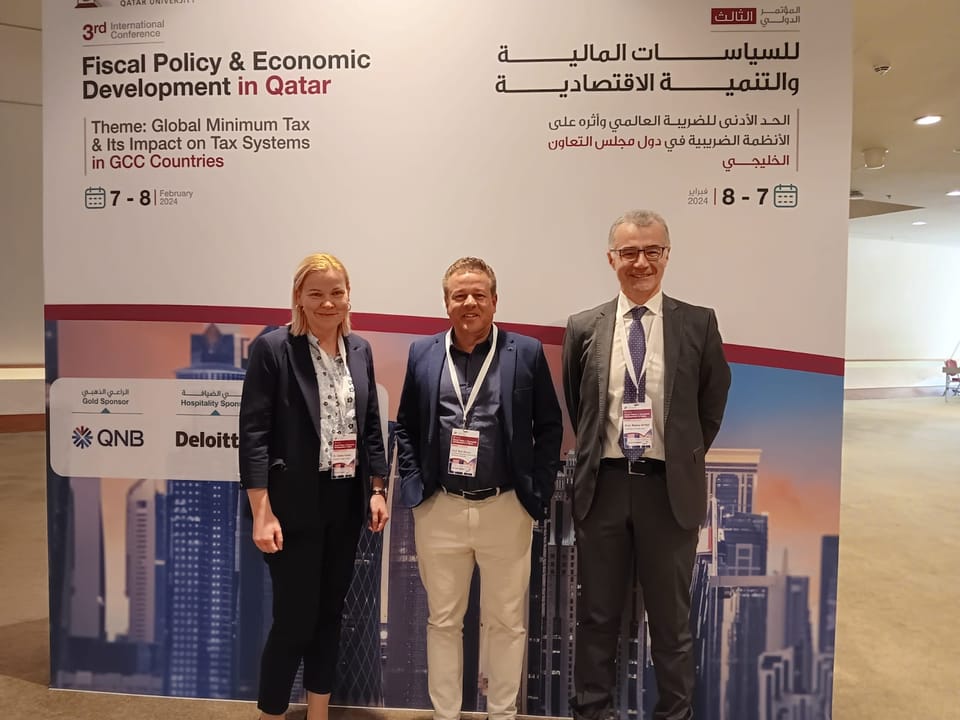Finding in Doha

I have been invited by the University of Doha as visiting Researcher at the annual conference on Fiscal policy and Economic development. I presented twice, chaired once, and with the support of my friend and colleague Sabina Hodzic I prepared the final policy recommendation for Tax teaching in the country. Here they are:
Tax Education: Summary for the Conference Fiscal Policy & Economic Development
Taxation is experiencing a dramatic change worldwide. The UN and OECD have recently urged countries to adapt their domestic fiscal system to new rules and regulations, taking into account fairness, efficiency and sustainability, the ultimate goal being to prevent base erosion and profit shifting worldwide
Tax Education had both to adapt on one side, and to steer the change on the other side, in order to prepare the policymakers of the future and practitioners to the new challenges as they arise.
In this respect, Tax education in Doha is at the forefront of the change, as the success of the Conference on “Fiscal policy and economic development” clearly demonstrates.
The Qatari strategy of dialogue and inclusiveness is mirrored by the domestic academia as it has been investing in international relations, new teaching programmes and educational strategies. The interdisciplinary approach and the comparative methods have been the key drivers of such a strategy making the Qatar University the catalyst of such a change in the region and beyond.
Several foreign experts attended the conference, coming from countries all around the world.
They delivered their presentation, ignited the discussion and interacted with the local vibrant community of academics and tax experts: eventually contributed in defining policy guidelines.
The session was opened by Prof. Rana Sobh, Dean of the College of Business & Economics, Qatar University who addressed the audience stressing the importance of innovating education and methodologies of education in the region and beyond.
The first session was chaired by Dr. Ashraf Galal, Qatar University, Qatar, who coordinated the input statement by the foreign academics, eventually giving the floor to Mariam Al-Asmakh, Qatar University, Qatar who stimulated further observation by the local academic community, which stressed in turn the importance of further international cooperation.
At the end of the discussion it emerged clearly that the rise of the so called “Globe” system and the OECD promoted “Pillar II” demand for a stronger commitment in teaching, particularly in tax morale and tax compliance, together with the need to familiarize the new generation of lawyers, economists and accountants with a more modern understanding of corporate taxation, long forgotten in the region.
Therefore, the recommendation for Qatar University is to:
· Develop a curriculum with special focus on fiscal policy at all levels in education (bachelor, master and PhD)
· Make the learning program easy, transparent and accessible to all potential participants
· Provide promotion materials (books, flyers, brochures etc.)
· Educate professors and other researchers to share the new information and up to date taxation trends
· Create deeper connection with general tax authorities and other financial institutions to share the experience from practice
· Invite guest lectures from EU, US, Australia to hold a lecture on different tax topics (both onsite and online) for students and others
The Qatari educational system may play a role in this respect in the Gulf area, paving the way to a new understanding of international taxation, addressing the need for a fairer tax system, consistent with the local tradition but open to innovation.
Educated students in Qatar, as future policy makers, will be in the position to preserve fiscal competitiveness of the local system, while embracing innovation with an open mind and a proactive attitude.
